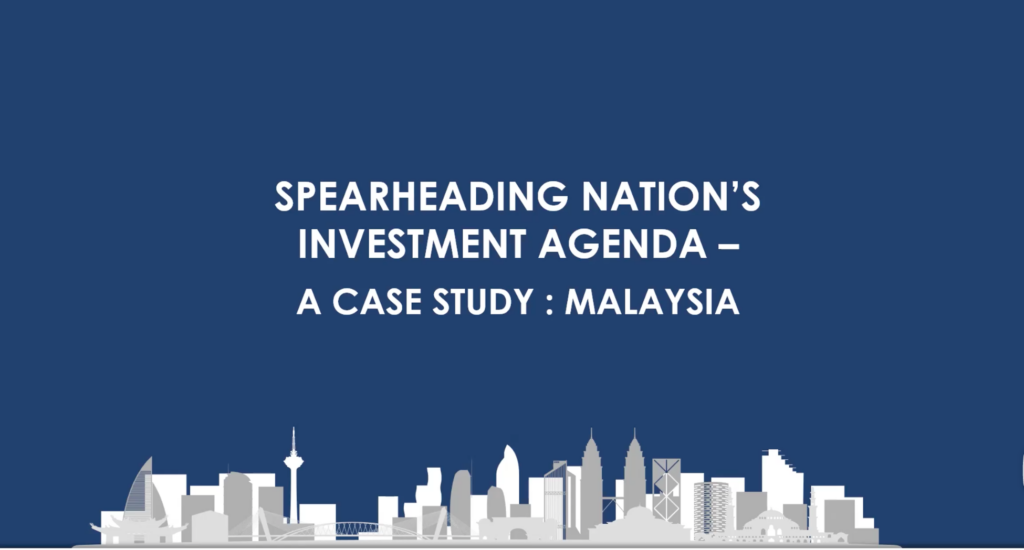On the evening of August 28, 2024, Ms. Lim Bee Vian, the former Deputy Chief Executive Officer of the Malaysian Investment Development Authority (MIDA), delivered a lecture entitled “Spearheading Nation‘s Investment Agenda—A Case Study: Malaysia,” as part of the “IPIRC Intellectual Property and Innovation” Lecture Series. The Lecture Series is organized by the Intellectual Property and Innovation Research Center (IPIRC) of Xiamen University Malaysia (XMUM) and co-hosted by the Intellectual Property Research Institute of Xiamen University (IPRI), and the IP Economy has provided media support for the lectures. Ms. Lim’s lecture was moderated by Professor Cheryl Xiaoning Long, Director of IPIRC, who introduced the keynote speaker warmly and expressed sincere gratitude while welcoming the audience. This online lecture attracted over a thousand participants from Malaysia, China, and other regions, receiving an enthusiastic response.

Main Lecture
At the beginning of the lecture, Ms. Lim Bee Vian provided a detailed overview of the critical role the Malaysian Investment Development Authority (MIDA) has played in the manufacturing and services sectors over the past fifty years. She highlighted that Malaysia’s rapid economic development has been closely tied to MIDA’s significant contributions in attracting foreign direct investment and promoting domestic investment. Ms. Lim emphasized that MIDA’s investment promotion strategies are continuously adjusted in response to changes in both national and global economic landscapes.
Ms. Lim then introduced Malaysia’s “three-pronged” investment strategy, which includes foreign direct investment, domestic direct investment, and regional development strategies. Using specific case studies, she elaborated on the role MIDA plays in facilitating various stages of investment projects, the investment promotion plans for the coming years, and the corresponding key strategic directions. She also provided an in-depth analysis of specific areas such as chemicals and advanced materials, green technology, advanced technology, and sustainable development.
Following this, Ms. Lim delved into Malaysia’s strengths and offered a comprehensive interpretation of the “Malaysia New Industrial Master Plan 2030”, encompassing both macro objectives and specific tasks. As such, the blueprint is an industrial policy focused on the manufacturing and manufacturing-related services sectors, covering the period from 2023 to 2030, and is intended to guide Malaysia’s new industrial development and investment promotion efforts in various crucial areas.
Furthermore, Ms. Lim explained Malaysia’s investment strategies and industry focus areas for 2024, highlighting four key sectors: semiconductors, green technology, electric vehicles, and the digital economy. She specifically discussed the Malaysia National Semiconductor Strategy, the Malaysian government’s commitment to green technology development and related initiatives, the National Automotive Policy and electric vehicle standards, 5G infrastructure access, and digital investments in Malaysia.
In concluding her lecture, Ms. Lim projected that Malaysia’s economy will grow by 4% to 5% in 2024. And she further presented data such as Malaysia’s GDP for the first quarter of 2024 and the total approved investments by MIDA, demonstrating the promising economic outlook for the country.
Q&A session
After the lecture, Professor Cheryl Xiaoning Long, along with the audience, engaged in an in-depth Q&A session with Ms. Lim, covering several critical issues. Questions raised included: What criteria are used to determine priority areas in Malaysia’s investment promotion strategy? What special incentives are available to foreign investors compared to domestic investors? What challenges do foreign investors face, and what measures has the Malaysian government taken in response? How does MIDA’s success compare to the experiences of other countries? What lessons can be learned from Malaysia’s experience for Malaysia’s future development and for other economies? And how will Malaysia address the potential issue of overcapacity in the electric vehicle industry? To these questions, Ms. Lim provided detailed answers, offering the audience a more comprehensive and in-depth understanding of the topics discussed.